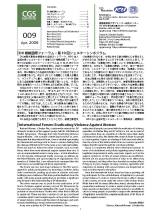 The ninth issue of the CGS Newsletter is now available both in print and online. Click the URL to download the PDF version.
The ninth issue of the CGS Newsletter is now available both in print and online. Click the URL to download the PDF version.
Contents of the CGS Newsletter 009
 The ninth issue of the CGS Newsletter is now available both in print and online. Click the URL to download the PDF version.
The ninth issue of the CGS Newsletter is now available both in print and online. Click the URL to download the PDF version.
Contents of the CGS Newsletter 009
Tomoko ENDO
Director, National Women’s Shelter Net
【The article below is the same as the article that appears in the ninth issue of the CGS Newsletter.】
National Women’s Shelter Net, a nationwide network for DV (domestic violence) victim support groups, held its 10th National Shelter Symposium, “Message from Asia: Eradicating Violence Against Women,” over a period of three days from Nov 23, 2007. Being their first international forum, it was a valuable opportunity for international exchange and to share a common feeling that the damage inflicted by DV is the same across national borders. There was much to learn from other countries, such as South Korea, which have more advanced support systems than ours. It was an unprecedented event in many ways ? a total attendance of 2,500 people, widespread media coverage, an address by the Prime Minister, and sponsorship by 64 organizations. As a member of Shelter Net, I am relieved and overjoyed that this event was so successful beyond all our expectations.
Kazuko TANAKA
ICU Professor/CGS Director【The article below is the same as the article that appears in the ninth issue of the CGS Newsletter.】
 The Program in Gender and Sexuality Studies (PGSS) was established in 2005 as ICU’s fourth undergraduate interdisciplinary program. It aims to be truly interdisciplinary by incorporating the natural sciences into the traditional framework of gender studies with its bias towards the social sciences and the humanities. This undertaking was achieved due to ICU’s trademark liberal arts education system, which upholds both breadth and depth of knowledge. The interdisciplinary strengths of PGSS will be further harnessed as the university is set to adopt an even more flexible department system in 2008.
The Program in Gender and Sexuality Studies (PGSS) was established in 2005 as ICU’s fourth undergraduate interdisciplinary program. It aims to be truly interdisciplinary by incorporating the natural sciences into the traditional framework of gender studies with its bias towards the social sciences and the humanities. This undertaking was achieved due to ICU’s trademark liberal arts education system, which upholds both breadth and depth of knowledge. The interdisciplinary strengths of PGSS will be further harnessed as the university is set to adopt an even more flexible department system in 2008.
Yuki NAGAO
Undergraduate student, ICU
【The article below is the same as the article that appears in the ninth issue of the CGS Newsletter.】
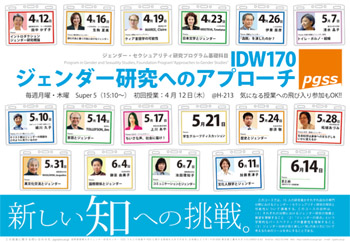 Many people who have only known me since I started university are surprised when I tell them that, in high school, I had demonstrated little interest in sexuality, let alone gender. In fact, I used to be quite vocal in my opinions about things like how a girl should at least be able to cook and sew. I think I was caught in an idee fixe that I had to be a “good girl” who is liked by everyone. At that time I had no idea that I was merely acting the part. Even though I had certainly felt restricted in some way, I tried hard not to be conscious of it.
Many people who have only known me since I started university are surprised when I tell them that, in high school, I had demonstrated little interest in sexuality, let alone gender. In fact, I used to be quite vocal in my opinions about things like how a girl should at least be able to cook and sew. I think I was caught in an idee fixe that I had to be a “good girl” who is liked by everyone. At that time I had no idea that I was merely acting the part. Even though I had certainly felt restricted in some way, I tried hard not to be conscious of it.
Shuhei OTSUBO
Undergraduate student, ICU
【The article below is the same as the article that appears in the ninth issue of the CGS Newsletter.】
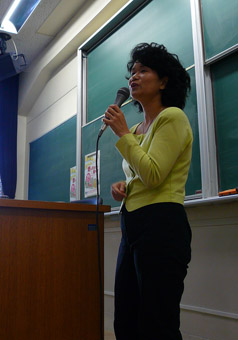 On October 5th, 2007, CGS and the ICU Placement Office co-hosted a seminar entitled “Why Suffer from Job Burnout? Tips for Your Future Career.” The speaker, Ms. Naoko Takayama, discussed the psychological pressures that people face in the workplace and offered advice from a counseler’s viewpoint on how to avoid these problems, based on case examples of her own clients. In order to make the topic accessible for students about to embark on their job hunting and other people interested in the possible problems of the workplace, she used detailed handouts and other interesting devices such as personal checklists to enable participants to identify their own individual issues.
On October 5th, 2007, CGS and the ICU Placement Office co-hosted a seminar entitled “Why Suffer from Job Burnout? Tips for Your Future Career.” The speaker, Ms. Naoko Takayama, discussed the psychological pressures that people face in the workplace and offered advice from a counseler’s viewpoint on how to avoid these problems, based on case examples of her own clients. In order to make the topic accessible for students about to embark on their job hunting and other people interested in the possible problems of the workplace, she used detailed handouts and other interesting devices such as personal checklists to enable participants to identify their own individual issues.
Eri SORIMACHI
Undergraduate student, ICU
【The article below is the same as the article that appears in the ninth issue of the CGS Newsletter.】
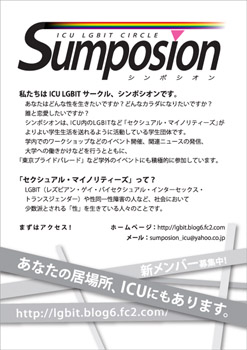 On September 12th, 2007, Sumposion, an LGBIT student group at ICU, submitted a petition to the university, demanding a more LGBIT-friendly campus. The petition included proposals for reform ranging from raising the awareness of faculty members to upgrading facilities such as lavatories and locker rooms.
On September 12th, 2007, Sumposion, an LGBIT student group at ICU, submitted a petition to the university, demanding a more LGBIT-friendly campus. The petition included proposals for reform ranging from raising the awareness of faculty members to upgrading facilities such as lavatories and locker rooms.
Aya TAKEUCHI
Freelance writer
【The article below is the same as the article that appears in the ninth issue of the CGS Newsletter.】
On November 17th 2007, Delta G held a workshop entitled “‘Pride Work’ Talk - Convincing and Satisfactory Jobs” for women and sexual minorities. The guest speakers were Mr. Issho Kon, Ms. Kyoko Okutani (Representative, WWB Japan) and Mr. Shigeru Yamamoto (Representative, Kotoba no Atelier). Okutani and Yamamoto both feature in Kon’s new book, Pride Work. WWB Japan, the Japanese branch of Women’s World Banking, was established in 1980 with the support of the United Nations and the World Bank in order to nurture women entrepreneurs. Kotoba no Atelier provides employment assistance for NEETs (young people Not in Education, Employment or Training) and hikikomori (individuals in self-confinement at home due to acute social withdrawal), through various activities such as their “All Neet Nippon” net radio program and the Tokiwa-so project. The event featured talks on actual practices such as Social Venture (social business organization), with the main theme being “Sustainable Work for Society and the Individual.”
Kazuya KAWAGUCHI
Professor, Hiroshima Shudo University
【The article below is the same as the article that appears in the ninth issue of the CGS Newsletter.】
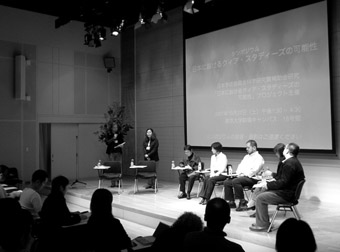 On October 27th 2007, a General Assembly for the Establishment of the Japan Association for Queer Studies (JAQS) was held at Tokyo University’s Komaba Campus. Close to 300 people braved the terrible weather to attend the session, despite the approaching unseasonal typhoon.
On October 27th 2007, a General Assembly for the Establishment of the Japan Association for Queer Studies (JAQS) was held at Tokyo University’s Komaba Campus. Close to 300 people braved the terrible weather to attend the session, despite the approaching unseasonal typhoon.
Sachiko TAKEUCHI
Manga Artist【The article below is the same as the article that appears in the ninth issue of the CGS Newsletter.】
Meet the lovely Ms. Sachiko Takeuchi, an up-and-coming lesbian manga artist. In her “Honey and Honey” series, she colorfully depicts the life she shares with her loved one in a way that is easy to follow even for non-LGBT readers. Here she
is looking at some of the feedback she has received from her readers. Enjoy!
Naomi SUZUKI
Graduate student, ICU
【The article below is the same as the article that appears in the ninth issue of the CGS Newsletter.】
As a self-professed feminist, the question of whether to assume a humble attitude or not has long been a concern for me. There are still many people in this world who require painstakingly humble explanations as to why, for example, a comment like “women are child-bearing machines,” is not simply an accidental slip of the tongue by some old geezer, but in fact relates to female discrimination on a much broader level. Those people are the ones who cannot listen unless women bow down and assume a humble attitude. However, before arguing that women are coerced into acting this way, I should first discuss what a “humble attitude” really means.
Izumi NIKI
Graduate student, ICU
【The article below is the same as the article that appears in the ninth issue of the CGS Newsletter.】
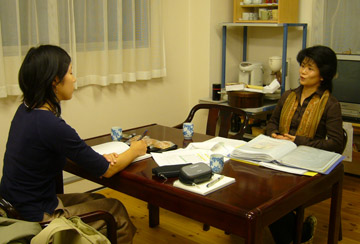 Support House Jomu is an NPO that provides a safe space for women who have experienced sexual discrimination or violence. It offers various courses and workshops, a counseling service, and a social lounge for relaxation. I interviewed Ms. Naoko Takayama, a counselor at Jomu who has counseled many women struggling with problems such as work-related issues, sexual harassment and more.
Support House Jomu is an NPO that provides a safe space for women who have experienced sexual discrimination or violence. It offers various courses and workshops, a counseling service, and a social lounge for relaxation. I interviewed Ms. Naoko Takayama, a counselor at Jomu who has counseled many women struggling with problems such as work-related issues, sexual harassment and more.
Tomomi YAMAGUCHI
Assistant Professor, Montana State University
On June 10, 2007, a workshop entitled “How Does Backlash on the Internet Occur?: the Interactive Relationship Between the Mass Media and the Discursive Sphere of the Web” was held at the Spring conference of the Japan Mass Communication Association at Kumamoto Gakuen University. Among the panelists were Masami SAITO (Toyama University), Chiki OGIUE (blogger), Akihiro KITADA (University of Tokyo), Tomomi YAMAGUCHI, and a special guest, Noriaki IMAI (writer). All the panelists are bloggers with a history of opposing backlash discourse on the web. Here, I would like to focus on two points that I consider to be particularly important. Please see the reports on the workshop already posted on the web for detailed information. *